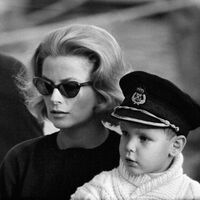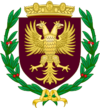Jacobus VI Claudius
This article is incomplete because it is pending further input from participants, or it is a work-in-progress by one author. Please comment on this article's talk page to share your input, comments and questions. Note: To contribute to this article, you may need to seek help from the author(s) of this page. |
| Jacobus VI Claudius | |||||||||
|---|---|---|---|---|---|---|---|---|---|
| Duke of Adrianople | |||||||||
 | |||||||||
| Latin Emperor Perateian Emperor | |||||||||
| Reign | 29 July 1993 – 3 November 2016 (alone from 1 January 2000) | ||||||||
| Acclamatio | 29 July 1993 | ||||||||
| Predecessor | Diana I Anicia | ||||||||
| Successor | Constantine XX Claudius | ||||||||
| Born | 15 December 1962 Palatium Augusti, Palatine, Castellum ab Alba | ||||||||
| Died | 3 November 2016 (aged 53) Palace of Augustus, Palatine, Castellum | ||||||||
| Burial | 12 November 2016 Imperial Crypt, Palatine, Castellum | ||||||||
| Spouse |
| ||||||||
| Issue Among others | |||||||||
| |||||||||
| Dynasty | Claudius | ||||||||
| Father | Leo Claudius, Duke of Adrianople | ||||||||
| Mother | Diana I Anicia | ||||||||
| Religion | Imperial Church (Catholicism) | ||||||||
Jacobus VI Augustus (Imperator Gaius Claudius Anicius Sabinus Anicius Iason Felix Alexander Hadrianus Caesar Augustus; 15 December 1962 – 3 November 2016) was 117th Latin Emperor, reigning from July 1993 until his death in November 2016.
Jacobus was born at the Palace of Augustus, in Castellum, as the eldest son of Latin Empress Diana Augusta and Leo X Claudius, making Jacobus the grandson Constantine XIX, as well as Jacobus Claudius, Duke of Adrianople. He was educated at Lyceum Sanctus Michaelis, and later Academia Militaris Olympia, becoming the first Latin heir apparent to earn a university degree. He served a year in the Latin Army, as a member of the Legio XVII Dianae. In 1980 he was made Count of Sasora and the North, a position he held until he was elevated to junior emperor in 1993.
He was acclaimed as junior emperor on 29 July 1993, after being elevated by his mother Diana I Anicia. Jacobus became sole emperor on 1 January 2000, when his mother Diana I Augusta abdicated. While not without his controversies, Jacobus was noted for his high popularity among Latins following his actions during the two major senatorial crises that took place early in his reign: The Group of Ten crisis and the 2000 electoral fraud investigations. In both instances, Jacobus's quick action and subsequent push for reforms were key in reintroducing faith among the citizenry in the electoral process and imperial government. However, Jacobus would have detractors from his reign after his repeated clashes with the Fabrian Church and numerous reports of infidelity. His reign is generally regarded favorably among most Latins, due to his swift action in the face of political and domestic turmoil. He passed unexpectedly on November 2016, and was succeeded by his only son, Constantine.
Jacobus married once to Stephania Pinaria, in 1987. He and Stephania had three children, Maria, Constantine, and Selene. While the marriage was notably happy, Jacobus had at least three illegitimate children from two different women that he recognized before his death.
Early Life and education
Jacobus was born at the Palace of Augustus, in Castellum, the second child and first son of Empress Diana I Ancicia and her husband Leo Claudius, Duke of Adrianople on 15 December 1962. Upon his birth he automatically took the titles Duke of Galata, Duke of Velia, He was baptized at Sancta Sapientia in Castellum, and invested as Prince of Youth on Christmas Day in 1962. His godparents were Michael Claudius (his father's uncle); Prince Theophylactus, Duke of Ossonoba (his mother's uncle); Princess Zoe, Duchess of Haenna (his mother's sister); and Anna Claudia (his father's aunt). He was also given the title Imperator Destinatus. He is named for his paternal grandfather Jacobus Claudius, Duke of Adrianople.
Jacobus was primarily raised in Castellum, at the Palace of Augustus, though regularly traveled between Castellum, Ascanium, and Adrianople with his family. He and his sister Princess Isabella were the first members of the Imperial Family to attend formal schooling, though both were tutored by a private governess until the age of thirteen. Jacobus attended Lyceum Sanctus Michaelis through secondary school, though spent the 1978 at Pescia Academy in Adrianople. During secondary school, Jacobus participated in the schools football program, also partaking was an avid golfer. It was in secondary school that he met his future first wife, Stephania Pinaria. Jacobus later remarked that secondary school was "a thrill" for him, and he "enjoyed being around other children his age from very early on."
After completing secondary school, he enrolled at Academia Militaris Olympia, and joined in the Latin military, for his tertiary education. Before attending Olympia, Jacobus spent a gap year traveling Belisaria. While at Olympia, he participated with the university's football team for one season. He graduated in 1984 and earned a degree in Philosophy, Politics and Economics. Jacobus did not actively serve in the Latin Army after graduation as is customary of Olympia students. He became the first Latin heir apparent, and later first Emperor, to earn a university degree.
Pre-reign political activities
Prior to his ascension, Jacobus was gradually appointed more and more duties as heir by his mother. Rumors in Castellum were that his mother's health was in a weakened state. These rumors further persisted when Jacobus began to fill in for his father on appearances and state functions. In an effort to combat the rumors, Jacobus was sent to Adrianople where he primarily served as Propraetor of the area and Count Palatine of the Occidens until 1995. In 1996, Jacobus was recalled to Castellum, when concerns of his mother's health began to arose after reports that she underwent surgery. He attended his first session of the Senate on 22 September 1996, much to the surprise of then Consul Justin Seius. Consul Seius commented that Jacobus's attendance was "rather odd, though not unwelcome." However, during the leaks arising from the 1998 Group of Ten cash for honors scandal, documents were discovered where Praeses Senatus Seius was vocal in faction meetings of his displeasure at Jacobus's regular visits to the Senate and sitting in on sessions in lieu of the either of his parents.
Count Palatine
In addition to his role as Count Palatine of Adrianole and the north, Jacobus was named Mesazon of Perateia by his mother on 22 June 1991. He immediately relocated his family to the Perateia, taking up residence at Lauseion. As Count Palatine, Jacobus was the chief representative of his mother in Perateia, and exercised governance over the local governments. Jacobus's court came to an end in February 1997 as rumors of his mother's health began to spread. Of the end of his time in Perateia, Jacobus said, "It's not something you like to think about. I've greatly enjoyed my time here, and for it to end, and especially on such sudden terms is disappointing."
Reign
Coronation Controversy
Following the death of his father, Jacobus was elevated to co-monarch by his mother, on 29 July 1993, jointly reigning until 1 January 2000. While he was acclaimed by the Senate the following day, his coronation as sole emperor was held on 25 December 2000, which took place at Sancta Sapientia. The event was plagued by controversy, as reports leaked officials within the imperial household pushed to have the event televised, causing a rage among the clergy and senate. The situation was further inflamed when it was leaked a week that a court official was negotiating with a number of television networks to host the event, drawing ire from the RAL. Jacobus released a public statement stating that "[these rumors] are exactly that, rumors. There are no plans to televise my coronation...it simply will not occur." His coronation was not televised.
Early reign and senate crises
The first legislative act signed by Jacobus as sole emperor was the One Man, One Woman Act of 1997. It was signed on 15 September 1997, and outlawed any attempt by county officials to allow same-sex marriage, however he never stated whether he personally supported or was against the bill. It wasn't until 1998 that Jacobus began to further assert himself into the political process, the first instance to deny assent to a legislative act of the Senate which would have privatized the NHS. The action by Jacobus was widely supported by opposition parties in the Senate, also resulting in a large spike in his personal popularity.
It wasn't until the Group of Ten scandal, which was brought to light and exposed by journalists from the RAL News, that Jacobus first began to more actively insert himself into governmental politics. Following the media reports, he promptly ordered an investigation into the matter, which resulted in arrest warrants being issued for Consul Seius, Energy Minister Lucceia, among other members of the Conservative government. Senator Jordana Lucceia was found dead in her office and determined to commit suicide by police investigations. The news of Lucceia's suicide prompted Jacobus to issue pardons for the remaining members of the leadership, but with the caveat that they were ineligible from participating in elections or public life for the remainder of their lives.
The Group of Ten scandal was the first occasion where Jacobus dissolved the Senate before a regularly scheduled election. The 1998 snap election was the first in nearly twenty years, and resulted in the consulship of Nicetas Taronitus, Latium's first Hellene consul in over 120 years. By 2000, the Progressive faction took control of the senate and managed to introduce a series of reforms to make the electoral process more transparent. The Progressives would hold control of the Senate until 2013.
Second decade
The second decade of Jacobus's reign continued with the elected government being dominated by the Progressive Party and the 13 year consulship of Constantine Otacilius. During this period, Jacobus and government promulgated a number of new laws and reforms, most notably the Welfare Reform Acts of 2006, the Healthcare Reform and Revitalization Act of 2002, and had attempted local government reform. The most controversial action of this period was the loosening of restrictions on abortions, and allowed for the activity under certain restrictions. Jacobus had originally threatened to withhold Imperial assent, though would later sign the measure into law after an amendment was added to prevent state funds from being used for procedures.
On 9 March 2014, his cousin Maria Tarpeia and leader of the Populares faction gained the Senate majority, and Jacobus appointed her the first female Latin Praeses Senatus. The new senate leadership saw further deterioration in Jacobus's relationship with church authorities as the Conservative government repeatedly attempted to push through hardline conservative measures, causing Jacobus to withhold assent. He would eventually sign into law the Morality Acts, though sources inside the Palace of Augustus stated that "the Emperor has severe reservations," and the law was never actively enforced. The peak of the government difficulties came when Consul Tarpeia sought to de-fund and privatize the SHM. Jacobus would veto the measure. The Tarpeia consulship came to an abrupt end in February 2016 and would eventually see a more centrist party leader in Alexander Pompilius become consul.
Conflicts with the Church
Throughout his reign, Jacobus had a number of difficulties with the church, which strained Latium's relationship with the Pope and Fabria.
Death
Jacobus VI died unexpectedly on 3 November 2016. His death was announced the following morning, when his body was discovered by his wife. It was reported that he died in his sleep, but no cause of death has been announced. A nine-day mourning period followed where his coffin rested at the imperial residence at the Palatine until 9 November, after which lying in state at Curia Claudia.
His funeral held on 12 November 2016, at Sancta Sapientia. The event was attended by close family, prominent officials and nobles, as well as representatives from many national governments and foreign royalty. Jacobus's wife Stephania, his mother Empress Diana, and his son Constantine provided eulogies. The Emperor was then entombed at the Imperial Crypt.
Personal Life
Growing up, Jacobus Augustus was an avid athlete. At age 6 he began playing organized football, and took up golf a year later. While at Olympia, played for the school's football team, initially under the pseudonym Michael Kontostefanos. He would participate on the school's football team for four months until it was leaked to the press he was participating.
Marriage and issue
Jacobus had his first public relationship in these years, when it was officially stated after weeks of speculation that he was dating his future first wife, Stephania Pinaria. The two were wed in 1987 and had three children: Maria, Constantine, and Selene.
Mistresses and illegitimate issue
Personality and Perception
Many consider Jacobus Augustus to be a pragmatic leader, which has lead to a great deal of discussion over his popularity. He had a reputation for controversial remarks and off the cuff statements. While little was known in 1997 how he would impact the nation when he was named junior emperor, he has since gained a great deal of popular support for his defense of fair elections and fight against corruption following the Group of Ten Affair which implicated nearly all of the Senate leadership, and later the Latin First voter fraud. His handling of these two events have caused him to receive an overwhelming degree of support.
Though many have criticized him for his actions against the church and infidelity during his second marriage. For the first time in over a hundred years, he removed and appointed a Archbishop of Castellum following a refusal to permit him from remarrying following his divorce with Zoe Verrucosa. Both Imperial Offices and the Archbishop's Camerlengo announced that Archbishop Thomas' departure was due to health concerns he and Jacobus discussed recently. Pope Benedict VIII threatened to excommunicate "any sovereign or government that tampers with internal affairs or members of the clergy." In response, the Senate began to debate a bill that would have required Senatorial approval to see any papal bull or order carried out with in Latium. Talk of excommunication eventually died down soon after and voter fraud crisis that came out of the 2000 senatorial election.
Titles, styles and arms
Titles and Styles
- 15 December 1962 – 29 July 1993: His Imperial Highness The Prince of Youth
- 25 December 1962 – 29 July 1993: His Imperial Highness The Duke of Galata
- 25 December 1962 – 29 July 1993: His Imperial Highness The Duke of Velia
- 29 July 1993 – 3 November 2016: His Imperial Majesty The Emperor
- 29 July 1993 – 3 November 2016: His Imperial Highness The Duke of Adrianople
- in Garza 29 July 1993 – 3 November 2016: His Imperial Highness The Duke of Tolosa
Foreign Honors
 Belfras: Excellent Collar of the order of Arbe
Belfras: Excellent Collar of the order of Arbe 
 Lyncanestria: Grand Cordon and Star of the Most Excellent Order of the Imperial Lion <imgur w="50">RdM1gc8.png</imgur> September 1997
Lyncanestria: Grand Cordon and Star of the Most Excellent Order of the Imperial Lion <imgur w="50">RdM1gc8.png</imgur> September 1997Kostritz: Knight Grand Cross of the Ducal Order of Kostritz
- File:Flag of Petra.svg Petra: Knight of the Order of the Holy Lance
Rahdenburg: Knight Grand Cross of the Order of Rahdenburg
Sydalon: Knight of the Order of the White Lion
Dynastic honors
 House of Hazaraspid: Knight of the Order of the Senmurv
House of Hazaraspid: Knight of the Order of the Senmurv 
House of Philes: Knight Grand Cross of the Order of the Golden Bee
House of Kordvatsi: Knight Grand Cross of the Order of the Griffin
Arms
Issue
| Name | Birth | Death | Notes |
|---|---|---|---|
| By Stephania Pinaria (married Sancta Sapientia 13 June 1987) | |||
| Maria, Crown Princess of Dakmoor | 3 July 1990 | Martin, Crown Prince of Dakmoor; had issue. | |
| Constantine XX Claudius | 15 January 1993 | Alazne Dain; had issue. | |
| Selene, Duchess of Saivres | 22 March 1997 | Audric, Duke of Saivres; had issue. | |
| By Princess Baela of Gauekoizarra | |||
| Juturna of Gauekoizarra | 3 June 1984 | Married Anastasius Claudius; had issue | |
| Larunda of Gauekoizarra | 3 June 1984 | Married Henry of Adelon; had issue | |
| By Princess Sibylla of Sydalon | |||
| Violant Claudia de Aultavilla | 18 August 1993 | Married Edgar Galan; had issue | |
Ancestry
| Ancestors of Jacobus VI Claudius | ||||||||||||||||||||||||||||||||||||||||||||||||||||||||||||||||||||||||||||||||||||||||||||||||||||||||||||||||||||||||||||||||||||||||||||||||||||||||||||||||||||||||||||||||||||||||||||||||||||||||||||||||||||||||||||||||||||||||||||||||||||||||||||||||||||||||||||||||||||||||||||||||||||||||||||||||||||||||||||||||||||||||||||||||||||||||||||||||||||||||||||||||||||||||||||||||||||||||||||||||||||||||||||||||||||||||||||||||||||||||||||||||||||||||||||||||||||||||||||||||||||||||||||||||||||||||||||||||||||||||||||||||||||||||||||||||||||||||||||||||||||||||||||||||||||||||||||||||
|---|---|---|---|---|---|---|---|---|---|---|---|---|---|---|---|---|---|---|---|---|---|---|---|---|---|---|---|---|---|---|---|---|---|---|---|---|---|---|---|---|---|---|---|---|---|---|---|---|---|---|---|---|---|---|---|---|---|---|---|---|---|---|---|---|---|---|---|---|---|---|---|---|---|---|---|---|---|---|---|---|---|---|---|---|---|---|---|---|---|---|---|---|---|---|---|---|---|---|---|---|---|---|---|---|---|---|---|---|---|---|---|---|---|---|---|---|---|---|---|---|---|---|---|---|---|---|---|---|---|---|---|---|---|---|---|---|---|---|---|---|---|---|---|---|---|---|---|---|---|---|---|---|---|---|---|---|---|---|---|---|---|---|---|---|---|---|---|---|---|---|---|---|---|---|---|---|---|---|---|---|---|---|---|---|---|---|---|---|---|---|---|---|---|---|---|---|---|---|---|---|---|---|---|---|---|---|---|---|---|---|---|---|---|---|---|---|---|---|---|---|---|---|---|---|---|---|---|---|---|---|---|---|---|---|---|---|---|---|---|---|---|---|---|---|---|---|---|---|---|---|---|---|---|---|---|---|---|---|---|---|---|---|---|---|---|---|---|---|---|---|---|---|---|---|---|---|---|---|---|---|---|---|---|---|---|---|---|---|---|---|---|---|---|---|---|---|---|---|---|---|---|---|---|---|---|---|---|---|---|---|---|---|---|---|---|---|---|---|---|---|---|---|---|---|---|---|---|---|---|---|---|---|---|---|---|---|---|---|---|---|---|---|---|---|---|---|---|---|---|---|---|---|---|---|---|---|---|---|---|---|---|---|---|---|---|---|---|---|---|---|---|---|---|---|---|---|---|---|---|---|---|---|---|---|---|---|---|---|---|---|---|---|---|---|---|---|---|---|---|---|---|---|---|---|---|---|---|---|---|---|---|---|---|---|---|---|---|---|---|---|---|---|---|---|---|---|---|---|---|---|---|---|---|---|---|---|---|---|---|---|---|---|---|---|---|---|---|---|---|---|---|---|---|---|---|---|---|---|---|---|---|---|---|---|---|---|---|---|---|---|---|---|---|---|---|---|---|---|---|---|---|---|---|---|---|---|---|---|---|---|---|---|---|---|---|---|---|---|---|---|---|---|---|---|---|---|---|---|---|---|---|---|---|---|---|---|---|---|---|---|---|---|---|---|---|---|---|---|---|---|---|---|---|---|---|---|---|---|---|---|---|---|---|---|---|---|---|---|---|---|---|---|---|---|---|---|---|---|---|---|---|---|---|---|---|---|---|---|---|---|---|---|---|---|---|---|---|---|---|---|---|---|---|---|---|---|---|---|---|---|---|---|
| ||||||||||||||||||||||||||||||||||||||||||||||||||||||||||||||||||||||||||||||||||||||||||||||||||||||||||||||||||||||||||||||||||||||||||||||||||||||||||||||||||||||||||||||||||||||||||||||||||||||||||||||||||||||||||||||||||||||||||||||||||||||||||||||||||||||||||||||||||||||||||||||||||||||||||||||||||||||||||||||||||||||||||||||||||||||||||||||||||||||||||||||||||||||||||||||||||||||||||||||||||||||||||||||||||||||||||||||||||||||||||||||||||||||||||||||||||||||||||||||||||||||||||||||||||||||||||||||||||||||||||||||||||||||||||||||||||||||||||||||||||||||||||||||||||||||||||||||||
See Also
Jacobus VI Claudius Born: 15 December 1962 Died: 3 November 2016
| ||
| Regnal titles | ||
|---|---|---|
| Preceded by Diana Augusta |
Latin Emperor 1997–2016 |
Succeeded by Constantine XX Claudius |
| Latin royalty | ||
| Vacant Title last held by The Prince Alexander
|
Prince of Youth 1962–1997 |
Succeeded by The Prince Constantine later became Emperor Constantine XX |
| Duke of Galata Duke of Velia 1962–1997 | ||
| Nobility of Latium | ||
| Preceded by Leo Claudius |
Duke of Adrianople 1997-2017 |
Succeeded by Constantine XX Claudius |
| Garzan nobility | ||
| Preceded by Leo Claudius |
Duke of Tolosa 1997-2017 |
Succeeded by Constantine XX Claudius |
| Government offices | ||
| Preceded by The Duke Claudius |
Count of the East 1991–1993 |
Succeeded by Constantine Orontes |



